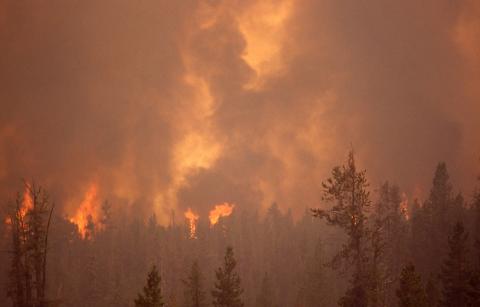Wildfires

Smoke from wildfires can irritate the eyes and respiratory system, as well as aggravate or exacerbate chronic heart and lung diseases.

Smoke from wildfires can irritate the eyes and respiratory system, as well as aggravate or exacerbate chronic heart and lung diseases.
Chemical emergencies occur when there is a release of chemicals into the atmosphere that could have harmful effects on people's health. A release of chemicals into the environment could be intentional, in the case of a terrorist attack, or unintentional, in the case of a train derailment. Since you may not immediately be aware of what type of chemical has been released, it is important to get to a safe place and follow the guidance of local officials. You may be advised by local officials to shelter-in-place or evacuate.
| Gastrointestinal series (upper & lower) Cigarette Smoking (average - several packs/day) CT Scan (head & body) Nuclear medicine examination of the brain Average annual background dose to humans Nuclear medicine examination of the thyroid Barium Enema Upper gastrointestinal tract series Radon in average household Dose to members of airline crews Nuclear medicine examination of the lung Need a Radiation Speaker?SCDES's Radiation Awareness ProgramOur free Radiation Awareness Program can provide you with knowledgeable SCDES speakers who will talk about radiation and nuclear power plants. We can also provide you with free educational materials. We will provide speakers for:
To Request a Speaker:Please include your name, contact number, organization, and a brief description of the presentation needed. Radiation, Nuclear SafetySCDES maintains response capabilities for incidents involving radiological materials and fixed nuclear facilities in South Carolina. We monitor and respond to situations at nuclear power plants, transportation incidents involving radiological materials, orphaned radiological sources, and other types of radiological events. Questions? Contact us by phone at: 1-844-RAD-RESP (1-844-723-7377). |